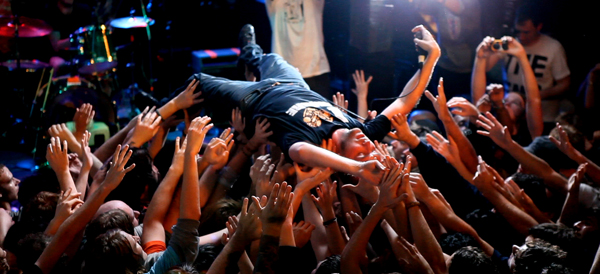Movie review by Greg Carlson
In Gabriel DeLoach and Zach Keifer’s sharp documentary “If We Shout Loud Enough,” Double Dagger vocalist Nolen Strals introduces “Helicopter Lullaby” as a song “…about Baltimore, but it could be about anywhere.” The sentiment applies as easily to the film, a spacious, gorgeous love letter to the vital DIY punk scenes that breathe life into communities from coast to coast. Conceptualized as a drums/vocals/bass trio by Bruce Willen, Double Dagger really bloomed once Denny Bowen replaced the band’s original drummer, pounding so hard that Willen was forced to “combine four bass amps just so he could hear himself play.”
Strals and Willen, who now teach graphic design at alma mater Maryland Institute College of Art, co-founded the Post Typography creative studio, and art nerds will positively salivate at the level of detail the men bring to every facet of the Double Dagger ethos. In one sequence, Strals lays out a kaleidoscopic gallery of screen-printed gig posters and he and Willen share the story of their Arab on Radar “Beat the Meatles” announcement, a lovingly profane collage that perfectly encapsulates the ecstasy of Post Typography.
There is much more to Double Dagger than songs about CMYK printing, keyboard functions, and fonts, and DeLoach and Keifer testify to the ways that the band transcended the limitations of the “graphicdesigncore” appellation as the group’s vision expanded.
When so many punk outfits take themselves way too seriously, the witty, occasionally ejaculatory humor on display in the movie forges some conspiratorial camaraderie between the viewer and the subjects of the film. Charm City music fan Tim Kabara, identified onscreen by the title “Baltimore Music Historian,” deadpans his way through a series of direct address interstices with mock gravitas, quipping of the band’s early days that “They were chaotic. They had different members. They were trying to find their sound. They sucked.”
DeLoach and Keifer perform the due diligence of providing the necessary historical context and include talking head support from key scene members like Dan Deacon, Sam Herring, and Jenn Wasner. Unsurprisingly, though, the movie’s real firepower explodes from the sweaty immediacy of the performance footage. Many songs are included in their entirety, and the decision not to truncate the music is one of the film’s great joys. Cathartic shoutalongs like “The Psychic” and “Vivre Sans Temps Mort” will make the hair on the back of your neck stand up. Like Strals leaving the stage to break down the barriers between performer and audience, DeLoach’s camera situates the viewer in the eye of the hurricane. It’s the next best thing to being there.
Like “The Last Waltz” and “Shut Up and Play the Hits,” the emotional heart of “If We Shout Loud Enough” roils and churns with the viewer’s knowledge that something really worthwhile is coming to an end. Of course, it is the finality that in part makes bearing witness so special. By the time we arrive at Double Dagger’s last show, performed October 21, 2011 at the Ottobar, the film will have made all kinds of new fans wishing they might have had the chance to see Double Dagger play live.
So get in the van. Eat bad food. Sleep only when you absolutely need it. Load in. Sound check. Create something. Make noise. Start a band.
“If We Shout Loud Enough” will play at the 14th Fargo Film Festival on Friday, March 7 at 3:10 PM. Tickets available at the door. If you can still hear following the screening, filmmakers Gabriel DeLoach and Zach Keifer will talk about their experiences making the movie and take questions from the audience.
